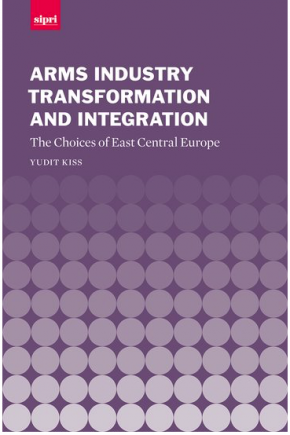
Arms Industry Transformation and Integration
Arms Industry Transformation and Integration. The Choices of Central Europe.
Oxford University Press, 2014.
The defence industry was one of the pillars of the command economy system in East Central Europe. After the end of the cold war the sector went through dramatic changes: it was radically downsized, reorganized and restructured according to the needs of the emerging new socio-economic systems. One of the major factors that shaped this adjustment was the enlargement of NATO and the European Union and the prospect of integration into these two organizations. The military establishments and defence industries became principal actors in the integration process, which helped them to acquire political legitimization and new economic resources. At the same time, integration presented unexpected challenges and constraints for the region's restructuring defence industry.
This book presents a comparative analysis of the defence industries of six East Central European countries-Bulgaria, the Czech Republic, Hungary, Poland, Romania and Slovakia-describing how they adjusted to the changed political and economic environment in both the domestic and international contexts. After the cold war, arms makers in East Central Europe found themselves confronting a situation like that faced by many of today's industrial producers: a drastic change of the economic, political and social environment. Their experiences provide valuable lessons for governments and companies in the post-2008 global economy.
Excerpt from the Conclusions
“Reacting to the current economic crisis, arms industry actors have started to use a new formulation of defence industrial identity, defining themselves as global security providers that focus on such new aspects of national security as homeland and environmental security and natural disaster prevention. The participation of business in ensuring global security can be a welcome development provided that the supremacy of security as a common good is respected and that security is not perceived as yet another saleable product.
The new notion of comprehensive security proposed by defence industrial players should not be a simple manoeuvre to capture alternative budget headings in the current period of financial meltdown and decreasing military budgets. A genuine reinterpretation of security as a universal common good that encompasses human and environmental security is an inescapable urgent task. Such a new security concept and the policies needed to implement it would bring about a fundamental change in the defence establishment, similar to that of the revolution in military affairs. For the time being this change only appears in verbal declarations.
Two or three decades ago leading arms producers presented themselves as system integrators, moving away from the simple production of weapon platforms. Today they describe themselves as ‘global partners building global security’. A Lockheed Martin representative noted that the company was expanding its activity in such fields as air traffic control, post-automation systems, state-building, peacekeeping and mission readiness: ‘We are transforming from large systems integration and defense to a global security enterprise’. ECE arms manufacturers that are in search of long-term development opportunities could actively participate in the redefinition of the security industry.
In 2008, shaken by the devastating impact of the world economic crisis and the lack of government help, desperate Bulgarian arms makers threatened to leave the sector and switch to the energy industry. Without realising it, they formulated a possible and desirable future for the sector. Former and present defence industrial companies could become key actors in exploring and investing in new fields of production and research, fighting against the most tangible dangers that threaten humankind: hunger, climate change, pandemics and the exhaustion of natural resources, such as water, arable land and energy."
Reviews
"(…) the first authoritative account of the adjustments in the East Central European defence industries in response to the changed political and economic environment of the post-Cold War era. (…) Yudit Kiss provides unique insights into the different strategies adopted by the countries."
Henrik Heidenkamp, Royal United Services Institute, The RUSI Journal, 160:2, 27 Apr 2015.
"(…) a positive and important characteristic of Kiss' research and narrative ability is the entwining of historical and current economic and defence factors. (…) Kiss' work is a tremendous and remarkably well-constructed resource. Her analysis of arms transformation in Eastern Europe is not only highly useful for analysts, but is timely and relevant as well."
Nathaniel L. Moir, State University of New York at Albany, Journal of Common Market Studies, Volume 53, Issue 6, November 2015.